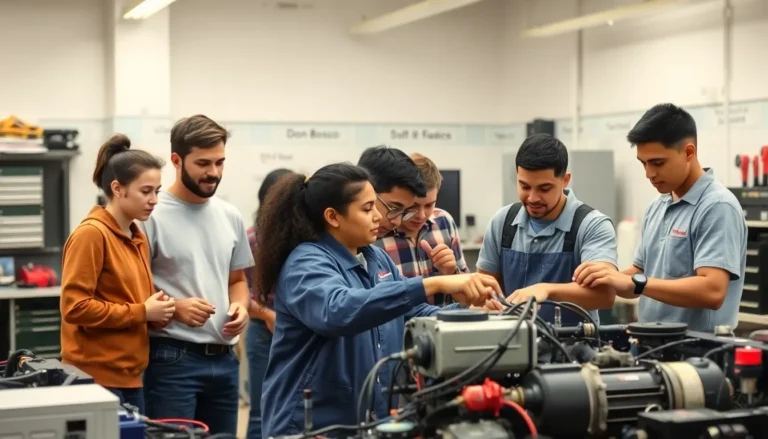In a world where remote work has become the norm, the H-1B visa saga takes a twist that’s got everyone raising their eyebrows. Imagine this: you’ve packed your bags for a promising career in the U.S., only to find out your visa’s been canceled because you decided to enjoy a little too much of the Indian sunshine. Yes, staying in India might just cost you your golden ticket to the American dream.
Table of Contents
ToggleOverview of H1B Visas
H-1B visas allow U.S. employers to hire foreign workers in specialty occupations. These positions require specific knowledge and expertise, often necessitating a bachelor’s degree or higher. The visa typically spans three years, with an option to extend it for an additional three years.
Requirements for obtaining an H-1B visa include a job offer from a U.S. employer and proof that the applicant possesses the necessary qualifications. Employers must submit a Labor Condition Application to the Department of Labor, ensuring fair wages and working conditions. The annual cap on H-1B visas is 65,000, with an additional 20,000 allocated for those holding advanced degrees from U.S. institutions.
Applying for an H-1B visa involves a lottery system due to high demand. Applications are usually accepted starting in April each year, with the selection process occurring shortly afterward. Maintaining visa status is crucial; staying outside the U.S. for extended periods can result in visa cancellation.
Consequences arise for individuals returning to India and remaining there too long. Extended stays might lead to difficulties in re-entering the U.S., jeopardizing employment opportunities. Ensuring compliance with visa regulations is vital for maintaining the ability to work in the U.S.
Employers and employees must stay informed about changes in immigration policy and work authorization. They must also understand the implications of remote work and how it affects visa status. Adhering to all requirements helps protect the interests of both parties involved.
Reasons for Cancellation

Several factors contribute to the cancellation of H-1B visas for individuals who stay in India for extended periods.
Immigration Policies
Changes in U.S. immigration policies can significantly impact H-1B visa holders. Regular updates to regulations may create stricter requirements that affect visa status. Laws can mandate that visa holders maintain a physical presence in the U.S. for employment continuity. Non-compliance with these evolving regulations can lead to visa cancellations. Staying informed about immigration changes plays a vital role in protecting one’s visa status.
Duration of Stay
The duration of stay outside the U.S. directly influences H-1B visa validity. Staying in India for more than six months can raise red flags with immigration authorities. They may interpret extended absences as a lack of intention to maintain residency in the U.S. Any prolonged stay beyond this limit poses a risk of automatic visa cancellation. Adhering to recommended guidelines ensures better prospects for maintaining visa privileges.
Impact on Indian Workers
H-1B visa cancellations significantly affect Indian workers aspiring to build careers in the U.S. The implications extend to various aspects of their professional and financial lives.
Career Opportunities
Job prospects for Indian workers diminish as H-1B visas become harder to secure. Losing visa status limits options for employment in the U.S. Many skilled professionals face increased competition for available positions, particularly since annual caps restrict new visas. Application processes remain competitive, and those who miss out may struggle to find similar opportunities back home. An extended stay in India worsens this scenario, as employers often prefer candidates already residing in the U.S. Moreover, other countries may become more appealing to skilled workers, leading to a brain drain effect from India.
Financial Implications
Financial stability for Indian workers can suffer due to H-1B visa cancellations. Inability to work in the U.S. may result in lost income and disrupted career growth. Many workers rely on their U.S. salaries to support families and commitments in India. Adjusting to a lack of income proves challenging, particularly for those who invested significant resources in their education and visa processes. Additionally, workers may find it difficult to regain previous salary levels if they choose to return to India. Job market volatility makes this transition more complicated, underscoring the need for proactive financial planning amidst these uncertainties.
Next Steps for Affected Individuals
Affected individuals must take specific actions to address H-1B visa cancellations. Understanding the pathways available for re-entering the U.S. can help mitigate potential career impacts.
Reapplying for H1B Visas
Reapplying for H-1B visas is a viable option for those who face cancellations. An individual must secure a new job offer from a U.S. employer. This employer will be required to file a new Labor Condition Application. The annual cap on H-1B visas, which is 65,000 plus an additional 20,000 for advanced degrees, makes timing important. Applying during the submission window in April enhances chances of acceptance. Preparing for the lottery system remains critical, as competition for these visas is intense.
Alternative Visa Options
Exploring alternative visa options can open new doors for affected individuals. The L-1 visa serves as a potential pathway for employees transferred within a multinational company. E-2 visas might be suitable for those from treaty countries willing to invest in U.S. business. Additionally, O-1 visas are available for individuals with exceptional talent in their fields. Consulting with immigration attorneys ensures individuals understand eligibility criteria and application processes for these alternatives. Expanding knowledge about available visas can increase career flexibility and potential opportunities.
Navigating the complexities of H-1B visa regulations is crucial for those considering extended stays in India. The risks associated with visa cancellations can significantly impact career trajectories and financial stability. As the job market becomes increasingly competitive, understanding the implications of remote work and compliance with immigration policies is essential.
Staying informed about changes in regulations and exploring alternative visa options can provide pathways for those affected. Proactive planning and timely action can help mitigate the challenges posed by potential cancellations, ensuring that career aspirations remain attainable in the U.S.




